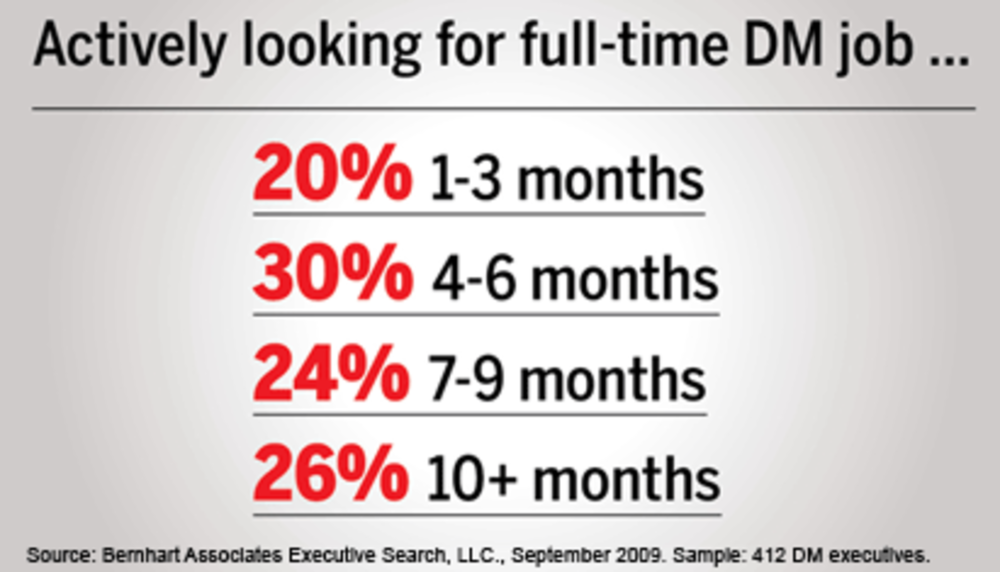Direct marketing pros have it worse than your average American when it comes to finding a job, according to a recent survey published by Bernhart Associates Executive Search. The research found that about one quarter of unemployed direct marketing professionals have been looking for jobs for more than 10 months.
The median length of unemployment for Bernhart’s survey respondents — more than 400 unemployed direct marketers currently looking for work — is nearly twice that of the national median. DM professionals report that they’ve been out of work for 6.52 months, or about 28 weeks.
Survey data released by the US Bureau of Labor Statistics (BLS) has found that one in three unemployed Americans have been job hunting for more than a half-year. Industry experts say direct marketers face a tough job market for various reasons. Jerry Bernhart, principal of Bernhart Associates, said companies are no longer rushing into hires.
“There was a time when business was booming and companies needed people quickly,” he said. “If a candidate had most of the qualifications they were looking for, they’d be inclined to move forward.”
According to the Bernhart survey, 20% of respondents said they’d been looking for a job for one to three months; 30% said four to six months; 24% between seven and nine months; and 26% for more than 10 months.
Seven to nine months had the highest number of respondents in the $50,000 to $100,000 pay range, while four to six months was the most commonly reported search time among those who make $100,000 to $150,000. Of those who make $200,000 or more, 36% said they’d been searching for more than 10 months.
While Ken Malek, president of executive search firm Ken Malek Associates, said these numbers don’t surprise him at all, he explained that they do represent a broader trend in how agencies are constructed.
“You have to realize there’s a huge shift happening in the way direct marketing agencies are organized,” he said, “not only because of the economy, but because traditional marketers who aren’t intent on being multichannel-focused are quickly becoming expendable.”
Kristina Palmer Shedd, director of hiring at interactive marketing firm Sapient, says that “client demands are evolving,” and agency staffs must likewise adapt.
“We’ve seen an increase in demands around having consumer experiences not only in one form of media but multiple forms,” she said. “We look for people who can offer complete skill sets.”
Connie Caroli, VP of executive search firm Crandall Associates, noted that the comparison between direct marketers and the US job force as a whole is not exactly apples to apples. The BLS has placed the unemployment rate at 9.7% for August.
“Keep in mind the BLS statistics include unskilled workers, factory workers and auto workers,” she said, “Therefore, they may be able to go back to work faster than those in the direct marketing industry, which is extremely focused.”
“[National] long-term unemployment has been increasing throughout the recession,” said Karen Kosanovich, senior economist at the BLS. She said the largest number of layoffs have been in the construction and manufacturing sectors.
“In recent months we’ve seen losses moderate nationally,” she said, “but we haven’t yet seen gains in any of those sectors, with the exception of healthcare.”
While BLS does not break down unemployment duration by industry, it did find in August that the national median term of unemployment was 15.5 weeks. That number is up from 9.5 weeks in August 2008 and 8.8 weeks in August 2007. There are 71,000 marketing and sales mangers out of a job, according to the BLS.
The Bernhart survey’s finding that direct marketing professionals who make more than $200,000 per year often have a more difficult job search wasn’t surprising to Caroli, who noted many of those jobs are difficult to find even when the economy is healthy.
“There are just less positions out there for those in that salary bracket,” Caroli said. “Even in the best of economic times, it sometimes takes some luck in order to find a job in that range.”
Some agency executives reported that the outlook is sunnier for marketing professionals with social media skills.
Sarah Hofstetter, SVP of emerging media and client strategy at 360i, said agencies expert in social media are well-prepared to weather the storm, providing more opportunities for workers.
“We’re seeing clients shifting budgets towards things like social media that they know will deliver results,” she said. “With the economic downturn, our clients are asking us to help them with the challenges, and therefore, we need more people.”
Sapient has also consistently hired in both its US and international offices, said Shedd.
“Since we’re involved in technology and interactive services, we need people with creative, advertising, marketing and media backgrounds all under one roof,” she noted. “Being a global organization in multichannel commerce, we’re constantly looking for highly specialized skill sets.”
Hofstetter said a reason for increased business is “that social media has officially gone mainstream.”
“When your CMO is on Facebook, it becomes easier to explain the necessity of the medium,” she said.








